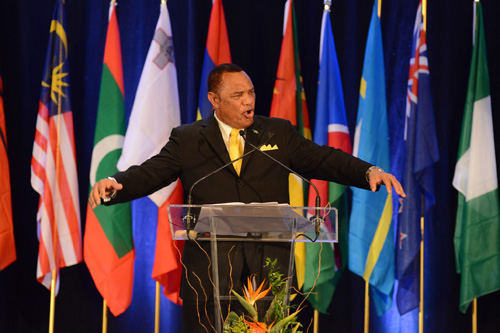Remarks by the Rt. Hon. Perry G. Christie PC MP Prime Minister of the Commonwealth of The Bahamas Official Opening Ceremony for The 19th Conference of Commonwealth Education Ministers on Tuesday, 22nd June 2015:
Mr. Kamalesh Sharma, Secretary-General of the Commonwealth Secretariat;
The Honourable Jerome Fitzgerald, Minister of Education, Science and Technology in the Cabinet of The Bahamas and Chair of the 19th Conference of Commonwealth Education Ministers Meeting;
Education Ministers from throughout the Commonwealth;
Ministers of Government;
Members of Parliament;
Distinguished reverend gentlemen and Ladies;
Members of the Diplomatic Corps;
Permanent Secretaries and other senior Government Officials;
Conference Delegates;
Ladies and Gentlemen,
Good evening!
On behalf of my Government and the people of The Bahamas, it is my profound pleasure to welcome each and everyone of you, the distinguished delegates to this 19th Conference of Commonwealth Education Ministers. We are delighted to host you here in our nation.
You have converged here in The Bahamas at a critical time.
15 years ago, as signatories to the United Nations Millennium Declaration, each of the nations represented in this room, and more, agreed to set the world on a path towards more equitable development and opportunity. Put another way, building a Stronger, Safer, more Prosperous and Modern international community was recognized as requiring unprecedented global coordination and co-operation.
Today, however, we must affirm that much remains to be done if we are to keep that promise. We cannot yet claim to have achieved a Stronger, more equitable approach to development.
As we strive to make each of the constituent nations and territories of the Commonwealth Safer, we continue to struggle with violent crime within our respective borders. While the world’s murder rate has dropped by 19% in the past 8 years according to the United Nations, smaller countries such as my own, continue to struggle with violent crime.
But that is not the only challenge. As we work in each corner of the globe to build a more Prosperous Commonwealth, we are constantly reminded that the disparity between rich and poor continues to be dangerously acute. According to the 2014 Credit Suisse Data Book, the world’s top 1% now controls 48% of global wealth.
But the challenges go even further. As we invest in building a Modern Commonwealth in which we can deliver world-class services and programmes to our respective peoples, we are obliged to confront the painful reality that unacceptable disparities still exist in some of the most basic indicators of human development, such as life expectancy.
Given these challenges and the enormity of them, it is not an overstatement to say that, for this week at least, you are each of you an integral part of the world’s most important international gathering.
All the evidence points to the fact that education holds the key to overcoming these challenges.
Throughout the world, the rate of crime falls when the rate of education rises. Just a short distance from here, in the United States, the 2010 Census showed that a black man with a High-School diploma was 70% less likely to be imprisoned than one with no diploma.
The OECD, in its 2014 Education at a Glance Report, tells us that the more we learn, the more we earn. Throughout the industrialized world, a High-School graduate earns 10% more than the OECD average, a Vocational College graduate 30% more, and a University graduate 70% more.
In its 2013 Health at a Glance Report, the OECD shared a statistic even more worthy of our attention. Women who obtain a University degree live an average of 4 years longer than women who do not. Among men, higher education adds an average of 8 years life expectancy.
Ladies and gentlemen, let me put it to you this way: Each of us knows of children living on the edge of desperation, or opportunity.
Your work can make all the difference – between freedom and incarceration; employment and unemployment; indeed life and death.
In a year when the international community will decide its global education goals, I can think of no better motivation to “identify realistic and practical measures to ensure that every Commonwealth country is able to provide a world class education”
Education transforms lives. When we realize that education is the most powerful way of improving a person’s life, we will be more deliberate in our efforts to not only provide access to quality education, but to find ways to ingrain into the psyche of individuals and whole communities the value of an education.
According to the Education for All Global Monitoring Report “if all students left school with basic reading skills, 171 million people could be lifted out of poverty.”
Ladies and Gentlemen, this week presents the opportunity for us to develop strategies to empower our citizens and our countries towards educational success, and positive social, economic and cultural outcomes.
The fact of the matter is that greater emphasis must be placed on education. Not merely at the policy level but to ensure that policies become real, and are enacted. Too often, policies look good on paper but do not translate into substantive action.
I am certain that the challenges my country faces as it relates to education are similar to many of the countries represented here this evening. Each level of education – be it pre-school, primary, high school or tertiary – has its unique set of challenges. But thinking back to the global statistics I shared earlier, what I think should concern most of us, is the graduation rate of those students leaving high school.
Whether in terms of crime prevention, employment and earning potential, or life expectancy, High-School is a milestone through which all must pass to begin fulfilling their true potential.
Quality education can be measured by “its relevance to employment and its usefulness in assisting young people in the transition to full adulthood, active citizenship and productive and gainful employment.” This, my friends, is the essence of the theme under which your work will be organized this week; “Quality Education for Equitable Development: Performance, Paths and Productivity.”
The educational product that we offer must equip our students with the tools necessary to perform at satisfactory levels, avail themselves of various career paths and position them to be productive members of society.
I opened my remarks by noting how much further we must still go to meet the Millennium Development Goals outlined in the 2000 United Nations Millennium Declaration. I thought, in order to help bring focus to your discussions this week, that I would remind us of the Millennium Development Goal for education.
“To ensure that, by 2015, children everywhere, boys and girls alike, will be able to complete a full course of primary schooling.”
To this end, the Education for All Movement was established in 2000, when 164 governments agreed on an agenda to address six education needs by 2015:
1. Early childhood care and education
2. Universal primary education
3. Youth and adult skills
4. Adult literacy
5. Gender equality and
6. Quality of Education
Well, the Education for All Global Monitoring Report has been released, with a sobering conclusion: “Overall, not even the target of universal primary education was reached, let alone the more ambitious Education For All goals, and the most disadvantaged continued to be the last to benefit.”
On a more positive note, however, the report asserts, “but there have been achievements that should not be underestimated. The world will have advanced by 2015 beyond where it would have been if the trends of the 1990s had persisted.”
One of the priority themes which I have been stressing both at home and abroad in my dual role as Prime Minister and the current CARICOM Chair has been improving the lot, expectations and future of young people through education and related programmes.
In pressing that message I have strenuously advocated that we should engage in programmes which reinforce the notion that every child must count and none must be left behind.
Indeed I would submit to you that there is no more compelling mission that we have today than to help secure the future of young people; to dissipate their sense of hopelessness; to fix the problem of joblessness; to ensure that regardless of their circumstances, they all get a good education; an education that will help them become a productive part of the formal economies of our countries.
While seeking to achieve excellence in education, the Ministry of Education of The Bahamas, as a deliberate policy of my Government, has embarked upon a programme that focuses on raising the educational attainment amongst the bottom 50% of those in our public school system. This is absolutely critical because the problem we have – and it is a huge problem at that – young persons simply lack the training and basic skills that are required to take advantage of employment opportunities. Some are either distracted or find it difficult to learn at the pace of their peers. My Government is therefore making a number of interventions to address these issues among children and young persons.
I would like you to be aware that we are translating the conceptual into reality; translating policy into action. Of particular note in this regard, we are establishing a special school for young people with behavioural issues that militate against their educational development, employability and social conduct. The professional resources in education, psychological assistance, mentoring and motivation will be provided. Other centres catering to younger children with special needs and young adults with developmental disabilities have also been established so that families can be assured of their continued care and development. This initiative will make a major difference in the quality of life for these challenged children, young people and for their families which will benefit our society as we continue to build the modern Bahamas.
And so, distinguished delegates, ladies and gentlemen, we face a myriad of challenges as we pursue our mission of educational reform. The challenges that I have touched on in these remarks are common to nearly all of us in the Commonwealth, irrespective of geography, culure, ethnicity or economic disparities. These challenges and the problems that give birth to them are for nearly all of us common denominators that have relevance and resonance for our respective countries and our national educational systems. All the more reason, therefore, why collaboration band co-operation with each other in tackling these problems and meeting the challenges of which I have spoken must become a major part of our forward planning and strategic outreach.
I, for one, am supremely confident that by working together we will be brought ever closer to the realization of the lofty goals we have set for ourselves as we seek to make the peoples of the countries we serve better prepared not only to survive but to prosper in the challenging world that lies before them,
Thank you for your kind attention. Again, I welcome you most heartily to the Commonwealth of The Bahamas and wish you every success in this conference.











![A Con Artist [RACIST] wants Bahamians to fight progress – WELL, WHAT IS THIS?!](https://www.bahamaspress.com/wp-content/uploads/2025/07/Toby-Smith-218x150.jpg)
